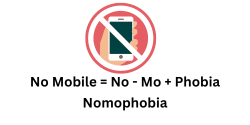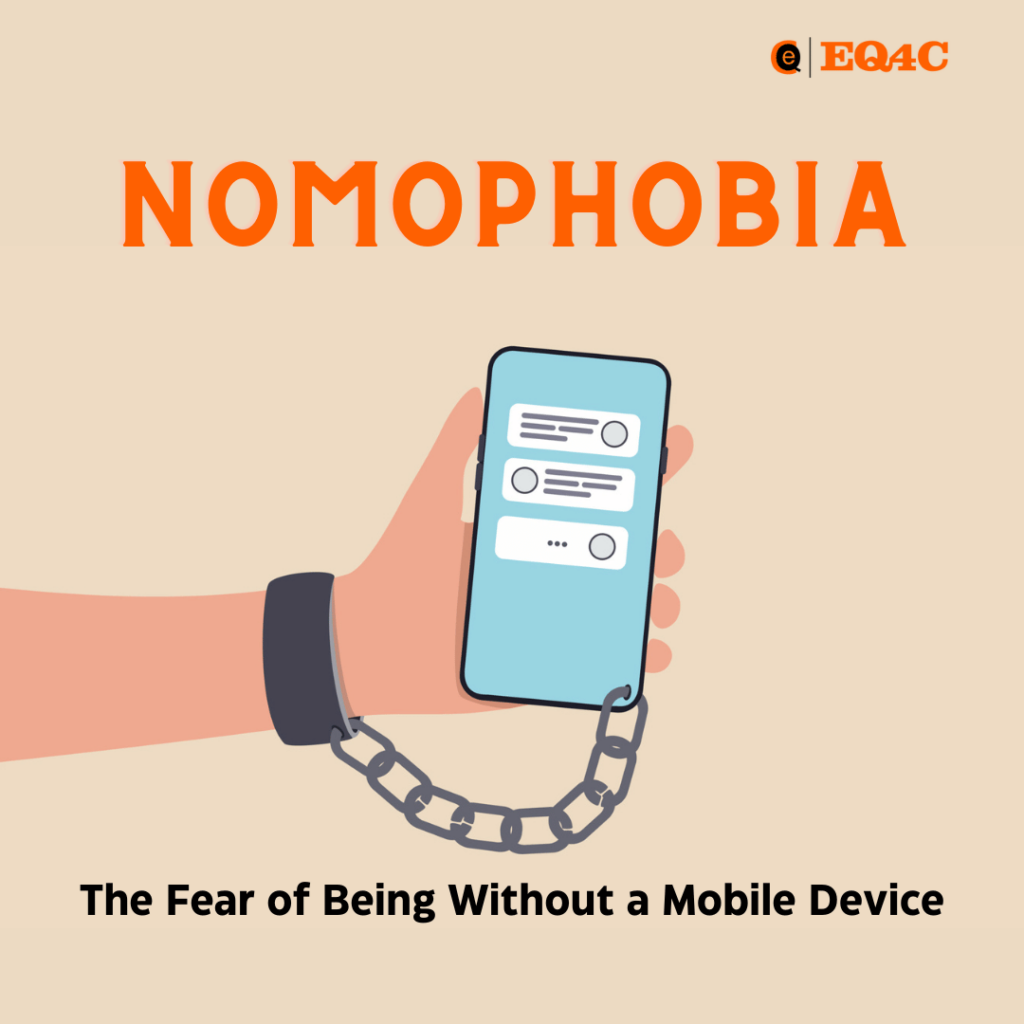Nomophobia is a relatively new term that describes the fear of being without a mobile phone. It is a real and growing concern for many people, as our dependence on technology continues to increase.
In this article, we will explore the causes and symptoms of nomophobia and provide some tips and strategies for overcoming this fear.
What is Nomophobia?
It is a condition that affects a growing number of people, especially as mobile phones have become an essential part of our daily lives.

Nomophobia is not an official diagnosis, but it can cause significant distress and impact a person’s ability to function in daily life.
The term “nomophobia” was coined by two researchers, Nicola Luigi Bragazzi and Giovanni Del Puente, in a 2014 article published in the journal Psychology Research and Behavior Management. However, it’s worth noting that the concept of fear or anxiety related to being without a mobile phone had been studied by other researchers prior to the coining of the term “nomophobia.”
The article “A Proposal for Including Nomophobia in the New DSM-V” by Nicola Luigi Bragazzi and Giovanni Del Puente, published in the journal Psychology Research and Behavior Management in 2014, proposes that nomophobia be included in the Diagnostic and Statistical Manual of Mental Disorders (DSM-V) as a specific phobia.
The authors define nomophobia as the fear or anxiety related to being without a mobile phone or not having network coverage. They argue that nomophobia is a growing problem in modern society, and can lead to a range of negative consequences, including impaired social functioning, decreased productivity, and poor mental health.
The article provides a review of the literature on nomophobia, including studies that have investigated its prevalence, correlates, and impact on mental health. The authors also propose a set of diagnostic criteria for nomophobia, based on the criteria used for other specific phobias in the DSM-V.
Symptoms of Nomophobia
If you are experiencing nomophobia, you may notice some of the following symptoms:
- Anxiety or panic when you can’t access your mobile device
- Constantly checking your phone, even when you don’t have a notification
- Feeling agitated or restless when your phone battery is low or when you don’t have your charger
- Checking your phone first thing in the morning and last thing at night
- Feeling like you are missing out if you are not constantly connected to social media or other apps
- Neglecting responsibilities or relationships because of your phone use
- Physical symptoms such as headaches or muscle tension when you can’t access your phone
Causes of Nomophobia
There are several reasons why someone may develop nomophobia. Some common causes include:
Fear of Missing Out (FOMO)
One of the most common reasons for nomophobia is the fear of missing out. People may feel like they need to be constantly connected to social media and the internet to keep up with the latest news and trends. They worry that if they disconnect from their mobile phone, they will miss out on important information or experiences.
Anxiety and Depression
Anxiety and depression can also contribute to nomophobia. People may use their mobile phones as a coping mechanism to distract themselves from negative thoughts and feelings. The idea of being without their phone can trigger anxiety and cause distress.
Dependence on Technology
Our dependence on technology is also a contributing factor to nomophobia. Mobile phones have become an essential part of our daily lives, and many people rely on them for communication, work, and entertainment. The idea of being without a phone can feel overwhelming and cause feelings of panic.
Symptoms of Nomophobia
Symptoms of nomophobia can vary from person to person, but some common signs include:
Obsessively Checking Your Phone
People with nomophobia may check their phone excessively, even when there is no reason to do so. They may feel anxious or uneasy if they are unable to check their phone regularly.
Panic or Anxiety when Separated from Your Phone
The idea of being without a phone can trigger feelings of panic or anxiety in people with nomophobia. They may feel like they are missing out on something important or worry that they will be unable to function without their phone.
Inability to Turn Off Your Phone
People with nomophobia may have difficulty turning off their phone, even when they know they should. They may feel like they need to be available 24/7 and worry that they will miss important calls or messages.
Diagnosing Nomophobia
If you think you may be experiencing nomophobia, you should take our scientifically designed Phone Addiction Quiz and if necessary, talk to your doctor or a mental health professional. They can evaluate your symptoms and determine if you have nomophobia or another anxiety disorder.
Treating Nomophobia
There are several ways to treat nomophobia:
Cognitive-behavioral therapy (CBT) – a type of therapy that helps you change negative thought patterns and behaviors related to your phone use.
Exposure therapy – gradually exposing yourself to situations where you are without your phone can help desensitize you to the anxiety it causes.
Mindfulness techniques – practicing mindfulness can help you become more aware of your thoughts and feelings and learn to manage them without relying on your phone.
Medications – in some cases, medications may be prescribed to help manage anxiety symptoms.
Overcoming Nomophobia
If you are struggling with nomophobia, there are several strategies that can help you overcome your fear. Some tips include:
Set Boundaries
Setting boundaries around your phone use can help you overcome nomophobia. Consider turning off your phone during meals, meetings, or other important events. Limit your social media use and focus on being present in the moment.
Practice Mindfulness
Mindfulness practices can help you become more aware of your thoughts and feelings. Try practicing mindfulness meditation or other relaxation techniques to reduce anxiety and stress.
Seek Professional Help
If your nomophobia is causing significant distress or impacting your ability to function in daily life, it may be helpful to seek professional help. A therapist can help you identify the underlying causes of your fear and provide strategies for overcoming it.
Conclusion
Nomophobia is a growing concern for many people in today’s society. It can cause significant distress and impact a person’s ability to function in daily life. However, with the right strategies and support, it is possible to overcome this fear and regain control over your phone use.
FAQs
Here are some frequently asked questions about nomophobia:
1.How common is nomophobia?
Nomophobia is a relatively new term, and research on its prevalence is limited. However, studies suggest that up to 90% of people experience some level of anxiety when separated from their mobile phones.
2. Is nomophobia a real condition?
Nomophobia is not an official diagnosis, but it is a real and growing concern for many people. It can cause significant distress and impact a person’s ability to function in daily life.
3. Can nomophobia be treated?
Yes, nomophobia can be treated. Strategies such as setting boundaries, practicing mindfulness, and seeking professional help can be effective in overcoming this fear.
4. Is it bad to be dependent on your phone?
Being dependent on your phone can have negative consequences, such as reduced productivity, poor sleep quality, and increased anxiety. It is important to set boundaries and use your phone in a way that supports your overall well-being.
5. How can I reduce my dependence on my phone?
Reducing your dependence on your phone can be challenging, but some tips include setting boundaries, limiting social media use, and practicing mindfulness. It is also helpful to find other ways to cope with stress and anxiety, such as exercise or spending time in nature.
- King, A. L. S., Valença, A. M., Silva, A. C., Baczynski, T. P., Carvalho, M. R., & Nardi, A. E. (2013). Nomophobia: Dependency on virtual environments or social phobia?. Computers in Human Behavior, 29(1), 140-144.
- Elhai, J. D., Tiamiyu, M. F., Weeks, J. W., Levine, J. C., Picard, K. J., & Hall, B. J. (2018). Depression and emotion regulation predict objective smartphone use measured over one week. Personality and Individual Differences, 133, 21-28.
- Yildirim, C., & Correia, A. P. (2015). Exploring the dimensions of nomophobia: Development and validation of a self-reported questionnaire. Computers in Human Behavior, 49, 130-137. doi: 10.1016/j.chb.2015.02.059
- Thomée, S., Härenstam, A., & Hagberg, M. (2011). Mobile phone use and stress, sleep disturbances, and symptoms of depression among young adults—a prospective cohort study. BMC Public Health, 11(1), 66. doi: 10.1186/1471-2458-11-66
- Panova, T., & Carbonell, X. (2018). Is smartphone addiction really an addiction? Journal of Behavioral Addictions, 7(2), 252-259. doi: 10.1556/2006.7.2018.49
- Hwang, Y., Choi, H., & Lee, C. (2019). The relationship between nomophobia and sleep quality among college students: Mediating effect of bedtime procrastination. Journal of Korean Academy of Nursing, 49(1), 1-9. doi: 10.4040/jkan.2019.49.1.1
- Sahin, S., Ozdemir, K., Unsal, A., & Temiz, N. (2018). Evaluation of mobile phone addiction level and sleep quality in university students. Journal of International Advanced Medical Research, 4(2), 47-52. doi: 10.5455/jiamr.070412.or.012

